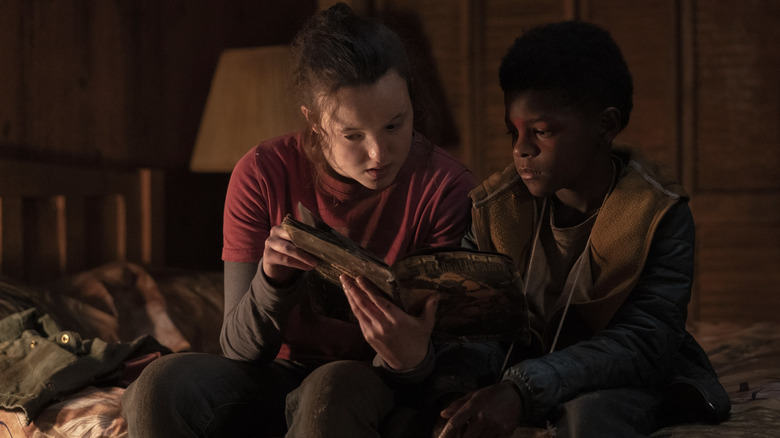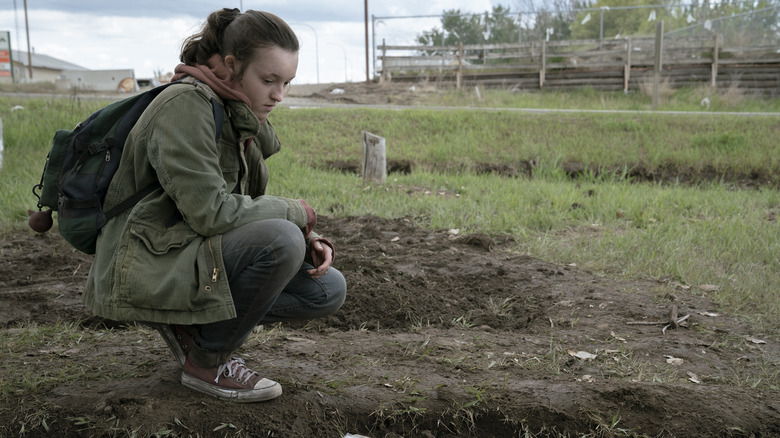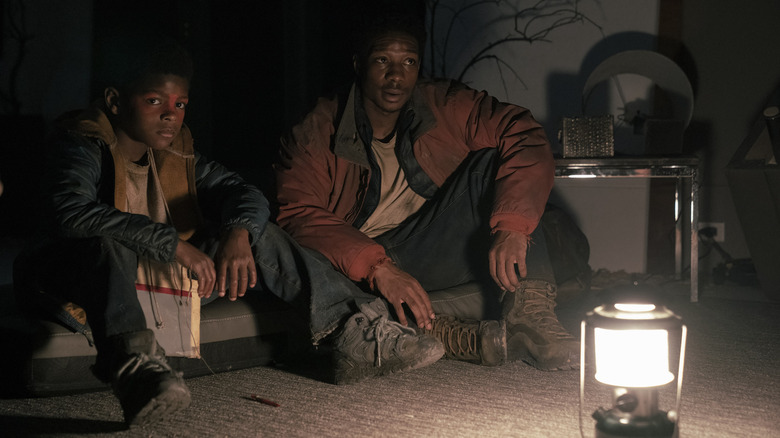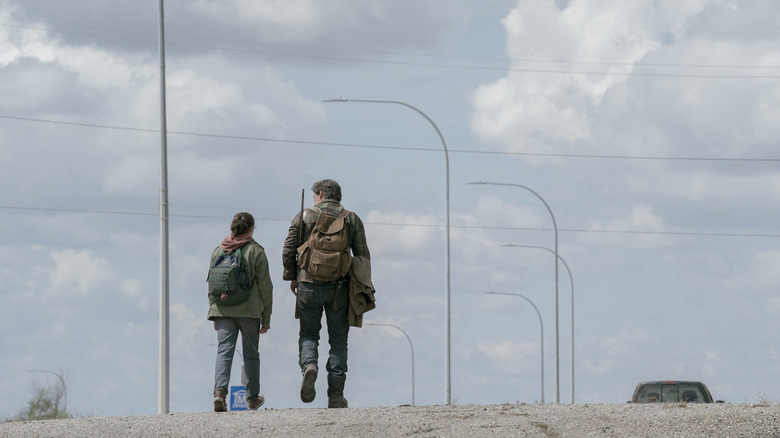The Last Of Us Episode 5 Proves Yet Again That This Is Not A Feel-Good Show
This post contains spoilers for episode 5 of "The Last of Us."
Thanks to the interruption of Super Bowl Sunday, the benevolent gods of entertainment delivered an extra special treat by releasing the newest episode of "The Last of Us" two days early. But after watching episode 5, sobbing into a box of Kleenex, and going to sleep with sorrow in our hearts, the blessing of an early episode is starting to feel more like a curse. Now, we have two extra days of wallowing in pain and attempting to recover from the sadness of "Endure and Survive," a top-tier tragic TV episode.
No big surprise here: the prestige drama about a cruel post-apocalyptic world overrun by mushroom zombies, fascist government agents, and relentless survivalists is a difficult watch! It's not like anyone looked at Pedro Pascal's stony expression on "The Last of Us" posters and expected a lighthearted zombie romp, but in my defense, there are very cunning people working behind the scenes. Despite the constant threat of danger and the grimdark legacy of zombie shows, "The Last Of Us" knows exactly how to lull us into its clutches with the promise of Joel (Pedro Pascal) and Ellie's (Bella Ramsey) relationship. Sure, the world is falling apart, but if this plucky young girl can get this traumatized curmudgeon to laugh at her dumb diarrhea puns, then maybe things aren't so bad!
But the idea of love saving one's soul is a bit too optimistic for "The Last Of Us." This is how we find ourselves grappling with the tragedy of Henry (Lamar Johnson), Sam (Kevionn Woodard), Kathleen (Melanie Lynskey), and Michael.
Endure and survive
Following up on last week's cliffhanger, this episode introduces us to a pair of unloaded gun-wielding siblings who are desperate to escape Kansas City. And while the guns initially inspire some tension ("Everything is great," Joel says in the world's most unconvincing tone), a friendship does emerge ... but even that has a caveat.
By virtue of their whole "lone wolf and cub" dynamic, it kinda feels like anyone who enters Joel and Ellie's story is doomed. Tess didn't even make it out of Boston and though they expected to meet up with Joel's friends, Bill and Frank were already dead when they arrived. So once it becomes clear that Sam and Henry are friendly, helpful, and basically the perfect traveling companions, their survival starts to feel a little uncertain.
But "The Last of Us" doesn't suffocate us with sadness. We're a little tortured with worry — going into the tunnels sounds horrifically dangerous and the sniper waiting on the surface is far from fun — but in between all the bad stuff, there's a heartwarming tint to the episode. How long has it been since either Sam or Ellie were allowed to be children? We've seen Ellie trying to find humor in the bleakness of their reality, pelting Joel with puns and slowly wearing down his tough exterior, but the girl still has a long way to go when it comes to her steely companion. No such barrier exists with Sam, who shares her love of Savage Starlight comics and jumps at the chance to play soccer in an abandoned underground daycare.
The tragedy of Henry and Sam
After suffering the trauma of nearly killing a man, it's nice to be reminded that Ellie still has room to be a kid. Well, it's nice until it isn't. We see it in her playful antics and the spark of joy that erupts the minute they discover the colorful playroom of comics, crayons, and toys. But we also see it in the aching motel bedroom scene, when she's convinced that if she smears some of her blood on Sam's wound, it'll enter his bloodstream and purge the infection. Alas, cordyceps do not follow "She-Hulk" rules. She can't share her immunity with a single touch.
Come morning, Sam as she knew him is already gone.
In arguably the most harrowing scene yet, Henry is forced to make an impossible choice. It wasn't enough for him to betray the leader of a revolution for medicine, or to sacrifice himself in the hopes that Kathleen would let the children go. Surviving FEDRA, a manhunt, and a swarm of infected still brings him to a hopeless moment of realizing that Sam is beyond saving. All he can do is mercy-kill his baby brother and turn the gun on himself.
If Bill and Frank were meant to show us what Joel and Ellie could become — two people who give each other a grander purpose in life — then what do Henry and Sam teach us? That no matter how hard you fight, one misstep is all it takes to lose?
Love is a powerful weapon
There's a simplicity that's so easy to crave in this story: the idea that despite everything that everyone has lost, having someone to care about will make life better. But it doesn't quite work like that, does it? Love, often a saving grace, can just as easily become a weapon that burns down the world. That all seemed fine when it was Bill encouraging Joel to put his disillusionment aside and dedicate his life to being a protector for someone he loves. After all, he and Frank lived out a beautiful love story, only occasionally interrupted by faceless looters incapable of dodging flamethrowers. But there are two sides to the conflict of "Endure and Survive."
"The Last of Us" is deeply invested in that gray morality of love — if you're willing to do anything for your loved ones, what does that make you? Sam and Henry. Kathleen and Michael. They are mirror images of one another, but that doesn't stop Kathleen from shoving a gun in their faces and demanding retribution. "Do you think the whole world revolves around him," Kathleen asks Henry? "That he's worth everything?" It's a classic case of the villain not realizing that they are the thing they loathe. Her desire to avenge her brother, like Henry's determination to protect his, becomes her downfall. She made vengeance priority number one, ignoring the fact that priority number seven was on the verge of erupting out of the earth to kill them all.
In the end, none of the four survives.
Becoming the monster
On the subject of this show refusing to grant us the serenity of simplicity, wouldn't it be nice to celebrate the downfall of FEDRA — particularly in Kansas City where the fascist government spent 20 years torturing those under their command? Yet the more we learn about the rogue revolutionaries, the bleaker their victory feels. They don't do trials, just massacres; they dedicate ample manpower to killing two kids; their defacto leader doesn't tell her people that a horde of infected is about to break through. Don't they see that they are no better than the monsters they destroyed?
It would be nice to blame nihilism for all the misery in "The Last of Us," but that's not exactly where this story lands. Life was not meaningless for Bill and Frank, who learned to do much more than just survive because they had each other. Or for Henry and Sam, who had each other to count on. Even when they were on the run, Henry knew that it was worth the world to make his brother smile. And in small moments that he refuses to acknowledge, Joel is realizing the same about Ellie.
As of right now, with the Fireflies and Tommy still miles away, they are all they have. It's a sobering fact to keep in mind as Ellie and Joel continue their journey. We already know that being a protector doesn't necessarily bring out the best in him: whatever he did to keep Tommy safe was so horrifying that his brother left him behind.
Way back on day one of the outbreak, Joel did not hesitate to leave a family of hitchhikers stranded on the road. It didn't matter that they had a kid because he had his kid. And now he has another. Given a second chance to keep a little girl safe, what won't he do?




